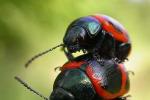Why 'sexual mind control' is rare in nature
The work published in Journal of Theoretical Biology provides an explanation.
Nature is replete with parasites that manipulate their hosts so as to enhance their own transmission rate. For example, the protozoan parasite Toxoplasma gondii is known to modify rat behavior (e.g. by increasing activity and decreasing awareness) so that cats, the definitive host of T. gondii, consume infected rats at higher frequency. Similarly, many crickets infected by juvenile nematomorphs make suicidal leaps into a water body, since adult nematomorphs are aquatic and free-living. Host manipulation by sexually transmitted parasites which increases host mating rate and thus parasite transmission rate has long been viewed as a plausible parasite adaptation. However, empirical evidence for it is rare. The study published in a February issue of Journal of Theoretical Biology provides an explanation for why this might be the case. Using mathematics to model both dynamics of a host-parasite interaction and evolution of an ability of the parasite to increase host mating rate, it shows that the conditions leading to evolution of such ability are somewhat restricted. In many cases, instead, evolution tends to decrease host mating rate or causes the host to go extinct in a process known as evolutionary suicide. Interestingly, where the mathematical model predicts evolution of disease-induced mating enhancement, its eventual magnitude remarkably agrees with the values available from the few existing empirical studies. The major reason for the limited scope of evolution of disease-induced mating enhancement appears to be that 'sexual mind control' costs too much, harming the host or leaving it not enough time to satisfy other needs. Recently, this study has earned a commentary in Science.














